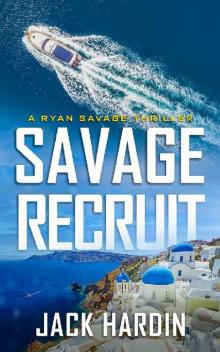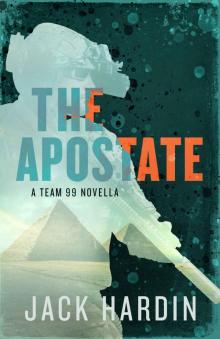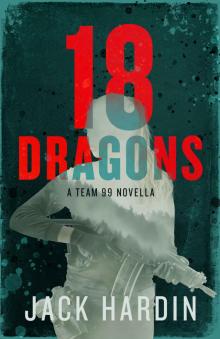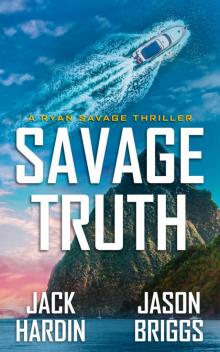- Home
- Jack Hardin
Breakwater Page 10
Breakwater Read online
Page 10
“Doesn’t matter. But yeah. Pretty soon I’ll be getting my own condo downtown.”
“Well, don’t forget about me,” Benito said. Then he asked: “So like, how do you get the girls? You just grab them up?”
Now Maury was walking on the ceiling and for some reason was no longer wearing a shirt. He was looking at Felipe and giving him a thumb and forefinger circle. “No. They don’t like me working it like that. Brings too much attention. I get to know the girls first. Makes it all a lot easier. Then they just come with me.” Felipe smiled at Maury and returned the thumb and forefinger circle.
“Boy, you’re one of the coldest people I know. Everybody who really knows you is half scared of you I’m pretty sure. Especially since you popped Paula’s cousin last year. How are you getting girls to like you and not run from you?”
“It’s easy.” Felipe jutted his chin toward the television. “It’s kinda like those girls on that show. You just have to find one who’s lonely and lie to her. The lonely ones want to believe you. They’re desperate.”
Both men shared a hearty laugh before taking another hit.
An hour later Maury had been replaced by Judge Judy when Felipe pried himself from the couch cushions and rubbed at his cheeks. He stood up. “I better fly. I got stuff I’ve gotta do. It’s been good hangin’ with you.”
“Man, you too.” Benito came to his feet and slapped his old friend on the back. “You shouldn’t wait so long to come by again. Next time, you bring a couple of your girls. We can make it a real party.”
“You got any more of that marimba I can take with me?” Felipe slipped a hundred-dollar bill from his pocket and put it in his friend’s hand.
“You know I do.” Benito disappeared around the corner and into the kitchen. He was back a minute later with a baggie half full of weed. Felipe’s money was tucked inside. He handed it over. “Keep your money. You and me, we go back too far for that kinda thing.”
After giving each other a quick hug, Felipe said goodbye and walked down the front steps to the cracked sidewalk. The neighborhood was familiar. He had grown up here, spending far more time on these streets as a boy than he did at school. He scanned for oncoming traffic and, seeing none, he crossed the street. He spent the next half mile walking at an unhurried pace. Nearly everything he looked at held a memory of some kind. Homes where friends or old girlfriends had grown up—some of them dead now, many of them incarcerated. Storefronts where he had spent hundreds of hours loitering or selling drugs. Nothing had changed over the last few years. Everything still looked the same. Same tired buildings and tired people. The same chain link fences rusted out, pulled up, and cut through. Everything about this neighborhood made him feel tired and depressed. Everything about it felt like a dead end with no hope of ever getting out.
But he had gotten out, and he didn’t regret a single decision that helped him to it.
Felipe turned down Alazon Avenue and stopped in front of a forsaken bus stop. The city had rerouted the bus lines five years ago, and somehow this one had missed inclusion into the edict to pluck up the old ones.
There wasn’t much to it. The backdrop was a steel mesh square with a concrete bench set in its center. Both were covered in layers of graffiti, and the bench had a chunk missing from the right side.
He sat down, still feeling the effects of the marijuana, but not so much that his chest couldn’t feel the ache. This was where he was headed when he stopped off for the unplanned visit at Benito’s. But the dull pang inside him had compelled the diversion. It was also what pressed him to accept the joint and to carry some out with him, even though he’d been clean of everything but cigarettes and alcohol for the last year.
He ran a hand down the top of the bench, remembering it all like it was yesterday. Except that it wasn’t yesterday. It was eighteen years ago today. He had been sitting right here in this very spot, his six-year-old hand clasped firmly in his mother’s. Felipe remembered her being tired that day. Waking before dawn each morning and juggling three low-paying jobs had produced dark circles beneath her eyes and stolen most of her smiles. Most days he wouldn’t even see her before he went to bed. But that day was different. Felipe had begged her for weeks to take him to his cousin’s house on the other side of town. She finally relented and took off the first half of the day to escort him there.
He remembered that morning being chilly. A storm had moved in the evening before and left the city damp and cloudy. The bus pulled in and left. When he asked his mother why they didn’t get on, she said that it wasn’t their bus. The next one would be by in five minutes.
But she only lived another three.
Felipe had been sitting right here with his legs dangling toward the sidewalk, his mother humming a quiet tune, when a dark car drove by and slowed in front of the bus stop. He watched the window roll down and a gun appear in its place. Then the shots came. One after another.
He could remember screaming, falling to the pavement with his hands clasped over his ears. It took an old man grabbing him up and getting him to his feet before realizing that the car was gone, the shooting over.
His mother lay dead at his feet, her body riddled with bullets.
The killers were never caught. The police said it was random. Justice never came for his mother.
Felipe learned something that day. Something the schools never taught him.
The world was cold and heartless. Those around him still worked and lived as if life rewarded the kind, the caring, and the hard working.
But he did not believe that. Life rewarded no one because it did not care. His mother’s killers had lived—probably still were alive. She was the one who had died, not them. This place should have been turned into a memorial and a statue or a tomb erected in her memory.
The good die young, and the rich grow old.
If being caring and kind got you gunned down at a bus stop, then why be good at all? If it was the cruel who survived, why not join them? At least then you weren’t waiting around for life to squash you. Why not live with the upper hand?
And so he had. Felipe had joined the darkness with abandon. He was eight when he started with petty theft—bubble gum, a bag of Doritos, Slim Jims. By the time he was twelve, he was slinging drugs with the best of them. Now, it was the girls, a new career twist that served to reinforce his life’s philosophy.
Only the strong survive.
He stood up. He wouldn’t come here again. A part of him was surprised that he even had. The past was the past. His mother wasn’t coming back.
He walked another three blocks along Alazon Avenue and turned south onto Emilio Siboney Drive. A dark gray van was parked on the curb across the street. Every few weeks they repainted it a new color and gave it different wheels. Cruz had even slapped a pink “Save the Tatas” bumper sticker on it. Felipe climbed in, started the engine, and was near to putting it in gear when he remembered the baggie in his pocket. He pulled it out. Cruz had left his cigarette lighter in the center cup holder. Felipe gave a quick glance down the street and, satisfied that there were no police in the near vicinity, he lit up.
And felt himself relax all over again.
Chapter Fifteen
Several miles southeast of Hialeah, far from the gaudy clamor of South Beach and the pastel-hued elegance of the art deco district, sat the epicenter of Miami’s Hispanic culture; Little Havana’s Caribbean spirit and Cuban character combined to make it one of the city’s most iconic neighborhoods.
At one time, a lower-middle-class Jewish neighborhood, Little Havana materialized in the 1960s when a large concentration of Cuban exiles, fleeing from fallout from Fidel Castro’s revolution, settled into the area. In the present, it continued as one of Miami’s largest Hispanic districts, rich in Cuban culture, its people well known for their friendliness and hospitality.
Jet stepped off the curb onto Calle Ocho and crossed to the other side. The vibrant street was famous for its restaurants and bakeries, ventanitas, and vibrant street festiva
ls, and busy locals combined with curious tourists to create an atmosphere charged with an energetic hum. He turned at Máximo Gómez Park and entered through its double iron gates. Also known as Domino Park, Máximo Gómez Park was host to several small, wood-framed pavilions boasting red tile roofs. Beneath each green painted pavilion sat a cluster of tables, each with room to seat four. All the tables were full. Elderly men with leathery skin, distended bellies, and gray beards joked and laughed as they slapped down dominoes, smoked cigars, and chided each other about past losses and old baseball scores. Jet joined the onlookers alongside one of the tables, thinking that playing dominoes outside with several friends wasn’t the worst way to pass your retirement years. The game finally ended when a man on Jet’s left added his last tile to the layout. The man across from him stood up. He indicated to Jet. “Are you playing?”
Jet held up a hand. “Thank you, but I should be going.” A frail, ancient of a man, whom Jet thought could have been friends with Methuselah—if not Methuselah himself—came around the table and delicately placed himself into the empty seat. Jet took his leave of the park and continued down Calle Ocho.
He passed up souvenir shops selling Cuban cigars, key chains, mugs, colorful sundresses, and fedoras and walked by a street vendor who was sitting on a bucket, making grasshoppers and parrots out of thin strips of palm fronds that he skillfully wove together.
At the corner of the next block, Jet stood in the doorway of Papi’s La Cubana, a local eatery whose sidewalk sign advertised today’s specials on ceviche and yuca frita. Beginning at 4 pm and ending at 6 pm, margaritas would be half price. He went in and was immediately hit with the pleasant smell of fried plantains. The lunch hour was nearing its end, and he stepped aside to allow a group of men in slacks and ties to pass.
The wood-framed ceiling hung low and was painted a dark blue. Potted palms and banana trees were positioned at regular intervals across the bare concrete floor, and across the room, a small wooden stage sat beneath a stained-glass window. Wooden table tops were inlaid with glazed orange, blue, and red tiles, and on the stage were perched a keyboard, a Batá drum, and a set of timbales, ready for whichever band would be playing this evening’s entertainment. Energetic Timba music streamed from speakers mounted in the rafters, complemented by hearty laughter coming from a small crowd at the bar.
A young lady in a light blue sundress offered a generous smile as Jet approached the narrow lectern that served as a hostess station. “Just one?” she asked.
“Actually, I’d like to speak with Saint,” Jet said. “If he’s here today.”
The young lady held the smile against the unusual request. “Yes, he is here today. Let me see if he can step away,” she said. “Is he expecting you?”
“No. But I only need a couple minutes of his time. My name is Jet.”
“One moment,” she said, and turned toward the kitchen. While he waited, Jet grabbed a soft peppermint from the bowl, unwrapped it, and popped it in his mouth. It dissolved quickly and was gone entirely by the time the lady returned. She gestured toward the bar. “You can wait over there. He’ll be out in a moment.”
“Thank you.” The television above the bar was showing the first of three away games the Marlins were playing against the Rockies. It kept Jet’s attention until a huge man came out of the kitchen. He looked like a Spanish version of a sumo wrestler, as though every part of his body had been overinflated. He went to the end of the bar and assessed Jet.
“I’m Saint. You wanted to talk with me.”
“Yes, please.”
“You a cop?”
“Private investigator.” Jet half-expected the cook to dismiss him and turn back to the kitchen. Instead, he motioned toward an empty table near the stage. They sat, and Saint folded his thick arms—which came close to resembling two legless dachshunds—across his chest.
“What do you need to know?” he asked. Jet introduced himself and spent the next couple of minutes explaining his interest in Juanita as well as the information he received from the young man in Hialeah. When he finished, Saint asked, “And this guy, he didn’t give you his name?”
“No. And I can’t say that I blame him. Any chance you remember that party?”
Saint scratched at his chin. “I do. I made a lot of money that night.”
“How so?”
“Cocaine. I used to deal. Had me a good hustle going. But one day I was helping my abuelita and found out that I like to cook. Even better, that people liked my cooking. So now that’s what I do. I got tired of looking over my shoulder every five minutes.” He shook his head. “Makes you feel old real quick.”
Jet asked, “Do you remember this guy being at the party?”
“Yeah. I do.”
“What does he look like?” Saint went on to provide the same description Alex had given him—the same one Juanita’s little brother had given the detective: tall, broad-shouldered, not skinny, but not overweight either, and possessing average facial features that offered nothing that would distinguish him from the next guy.
“Any idea where I can find him?” Jet was hoping this wasn’t where he hit a dead end.
“No. I have no idea.” Saint set his elbows on the table and folded his hands. “Now, I’m not saying this man is the same as your Jesse. The same man this guy in Hialeah saw. But the guy who pulled that gun at the party, his name is Felipe.”
“Any last name?”
He shook his head. “I just know him by Felipe. He used to work some of the curbs closer to downtown pushing smack.”
“He doesn’t anymore?”
“Nah. He almost got busted and quit. I’ll tell you this though. People like me,” he slapped his chest with an open palm, “are hard to find. I’m legit out of the game. Just a cook. But people like Felipe, they always gonna be running some kind of play. If you think he took this girl—or a bunch of girls—then that don’t surprise me.”
Jet had over thirty years in with the DEA. Saint, he knew, was right. It was rare that a dealer walked away from selling drugs on their own compulsion. It was especially rare if they were making a lot of money at it. Jet had only known one other person to have made such a decision: Samuel Diego. His girlfriend gave birth to a baby boy, and it seemed that was all the motivation he needed. Samuel quit the street, went to college, and, the last Jet had heard, was now the owner of a used tire shop in Estero. Assuming that Saint was telling the truth and that his dope days were over, it was to be commended. “Any idea where I could find him?” Jet asked.
Saint shook his head. “Nah. I made a clean break with my old plebe. That’s what gets you back in the game at some point. Got to change your friends if you want to change your life.” Saint shifted in his chair, and it protested loudly under his weight. Jet thought there was a good chance the man might end up finishing the conversation from the floor. “But you know,” Saint said, “I can make some calls after I get off and try to find out. Someone will know what he’s up to. Give me your number, and I’ll let you know when I find something.” Jet recited his number while Saint punched it into his phone. When he was done, Saint used the table to leverage himself off the chair. “You eat lunch?”
“Not yet.”
“How about I make you a Cuban sandwich or something? It’s on me.”
“Sure,” he conceded. “Thank you.”
Saint motioned toward a waitress. She was chatting with a co-worker near the kitchen door. “Maria will get you something to drink. Give me a few minutes.” He started toward the kitchen before pausing to turn back around. “I hope Felipe’s your man. I hope you can find that girl.”
“Thank you, Saint. Me too.”
Chapter Sixteen
Felipe slipped the keys into the ignition and started up the van. He felt better. The powerful strain of marijuana had been long overdue, and his time at the bus stop had served to reaffirm his cynical view on life.
He pulled into the road and drove until a red light forced him to come to a stop. An elderly gentlem
an crossed in front of him, and Felipe nodded a curt reply when the man lifted his hand in a gesture of friendliness. The light switched to green, and he eased forward. Save for the occasional car or bus, there was hardly any traffic. Most people on this side of town did not own a vehicle of their own, choosing instead to take advantage of the conveniences afforded to them by public transportation and taxi services like Uber or Lyft.
Up ahead, on his right, he saw two girls with dark hair. The tallest of the pair turned her head and laughed in response to something her friend had said. Her profile was clearly visible, and Felipe recognized her immediately.
He always planned his engagements with care. To the girls, he would “bump into them” or stop by at the perfect time, when they were on the way to the store or when he knew they would be alone at home. The friend up ahead did not know him; she had never seen him before. That was just the way he liked it. The fewer people who could identify him the better.
Felipe had not scheduled any engagements for today. Had his discernment not been tempered by the marijuana, he would have felt the impulse to drive past quickly or pull a U-turn before she was afforded a chance to recognize him or his van.
But that was not to be the case. His decision-making facilities were temporarily disconnected from the area of his mind that assisted him in making sound judgments.
The girls were wearing short sleeve shirts and black shorts. One of them had a large pink purse thrown over a shoulder. He smiled to himself as he slowed the vehicle and pressed a button on his door that brought down the passenger window. He leaned toward the open window and whistled. “Hey, Ana!” The girls stopped and cautiously assessed the van. “It’s me.” The sun was bright in the sky, and Ana stepped closer as she squinted into the vehicle. “Jesse!” she said excitedly, “I was just talking about you.”

 Savage Recruit (Ryan Savage Thriller Series Book 8)
Savage Recruit (Ryan Savage Thriller Series Book 8) Bitter Tide
Bitter Tide Vacant Shore
Vacant Shore Breakwater
Breakwater The Apostate
The Apostate 18 Dragons
18 Dragons Lonely Coast
Lonely Coast Savage Truth
Savage Truth Broken Stern_An Ellie O'Conner Novel
Broken Stern_An Ellie O'Conner Novel Broken Stern: An Ellie O'Conner Novel (Pine Island Coast Florida Suspense Series) Book 1
Broken Stern: An Ellie O'Conner Novel (Pine Island Coast Florida Suspense Series) Book 1